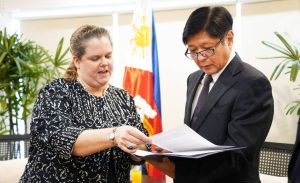A month ahead of taking office, Philippine President-elect Ferdinand Marcos Jr. told a U.S. official that he is considering the “re-signing or the extension” of a key military pact between the Philippines and the United States.
Marcos, who won a landslide victory at the country’s May 9 presidential election, said he aired the idea during a meeting with U.S. Chargé d’Affaires Heather Variava during a meeting at his election campaign headquarters in Mandaluyong City, The Inquirer reported.
“Security concerns of course have always been a big part of our relationship with the United States,” Marcos told reporters. He added that he and Variava had discussed the VFA, and how it might be updated to account for the rapidly changing geopolitical climate.
“Of course, we discussed about security issues, the return or the re-signing or the extension of the VFA and how it has to be redefined for the near future with the situation around the world, especially in our region,” Marcos added. The VFA, which took effect in 1999, functions as the sinew of the U.S.-Philippine alliance, laying out the rules for U.S. troops operating on Philippine soil.
Vague as it was, the declaration will no doubt be cheered in Washington, where anxiety over the alignment of the state of the Philippine alliance has run high since shortly after the election of Rodrigo Duterte in 2016. The VFA underwent a near-death experience under Duterte, who initiated a dramatic reorientation in the Philippines’ foreign relations, away from its treaty ally and former colonial ruler and toward Xi Jinping’s China.
In February 2020, Duterte announced that he would scrap the pact in February 2020, after a close ally was refused a U.S. visa for his role in Philippine leader’s bloody “war on drugs.” But he eventually backed down, and canceled the termination of the agreement after a visit by U.S. Defense Secretary Lloyd Austin last August.
In many ways, Marcos’ statement is unsurprising, given the generally pro-U.S. orientation of the Philippine political and security establishment. But the son of the former dictator has also given indications that he desires strong relations with the People’s Republic of China, with which his father normalized diplomatic relations in 1975. In a call with Xi last week, Marcos said that Manila’s ties with Beijing will “shift to a higher gear” when he takes office, despite the two nations’ ongoing frictions in disputed regions of the South China Sea.
“The way forward is to expand our relationship not only diplomatic, not only trade, but also in culture, even in education, even in knowledge, even in health, to address whatever minor disagreements that we have right now,” Marcos said. In reality, a desire for good relations with China has been more the norm than the exception for recent Philippine administrations, even if Manila currently faces greater challenges in squaring fruitful economic ties with China’s maritime assertiveness.
Recent comments point to the President-elect’s instinct that the Philippines should seek to maintain good relations with both contending superpowers. Whether such a balance will be possible in the context of growing Sino-American tensions is another question.

































